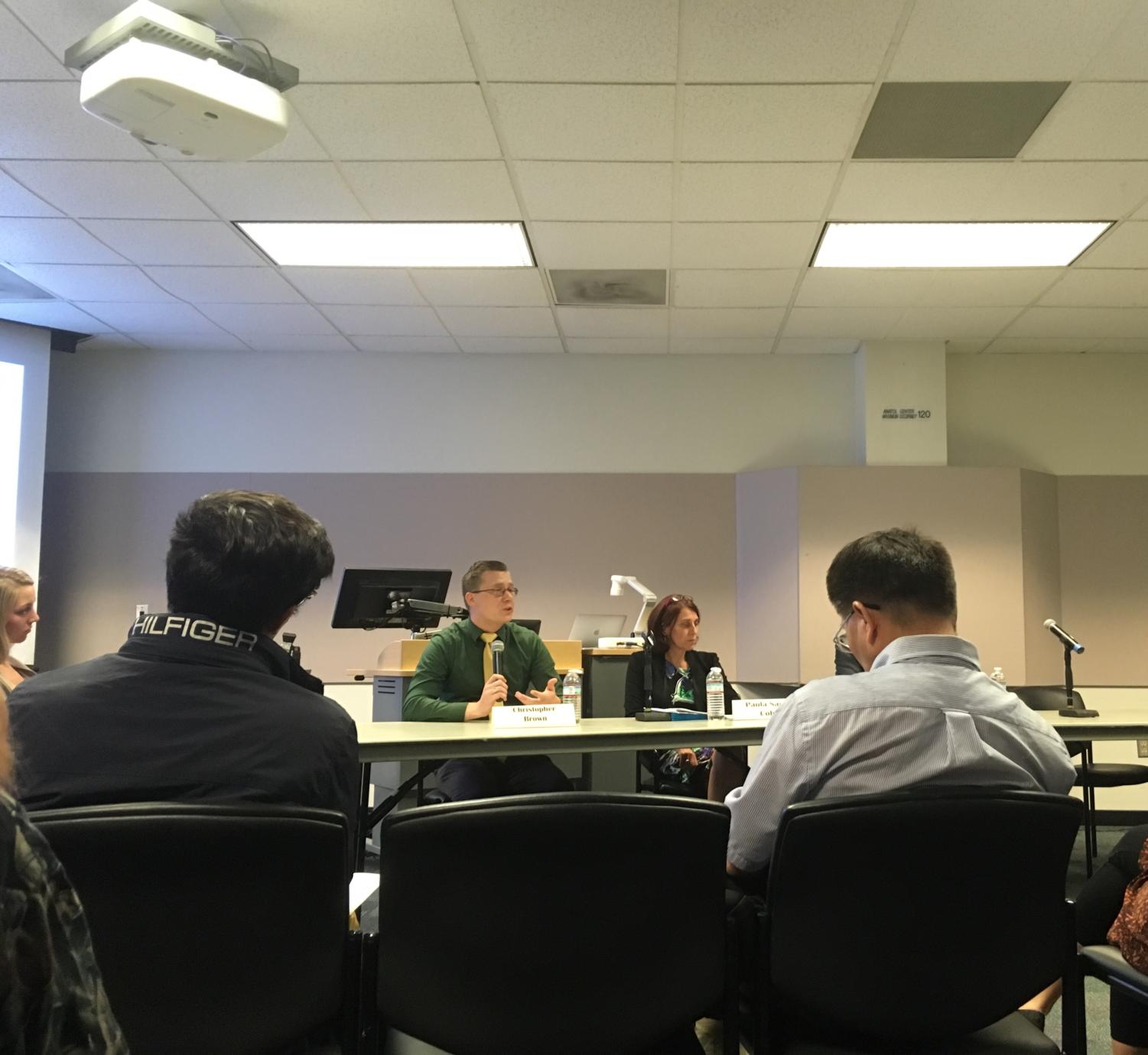In the spirit of domestic violence awareness month, symposium “Behind the Screens: Domestic Violence and Technology” was held at the Anatol Center Wednesday and dissected the concept of “power and control.”
The strategy combats the typical “perpetrator-survivor” analysis, in which the perpetrator and survivor are identified in a gender-based violence, but the influence of society on violence isn’t discussed.
According to WGEC student assistant Emily Cota, 133 attendees flowed in and out of the Anatol Center. A 10-minute survivor testimonial audio recording was played by Ebony Utley, event organizer and associate director of the Institute for Innovation and Entrepreneurship. The testimonial depicted an example of a “cyberstalking” situation between high school individuals.
A 45-minute panel discussion about the emotional and mental implications of an individual’s web reputation followed the testimonial featuring panelists Imelda Buncab, Kristelyn Berry, Addison Rose Vincent and Alyce Laviolette. The initial survivor testimonial alluded to the topic of “call-out culture,” an act that exposes confidential information about an individual by tagging them on social media without their consent.
“Technology is being used to confuse and make people look crazy,” said Addison Rose Vincent, risk reduction counselor at Asian Pacific AIDS Intervention Team.
For LGBTQ individuals, the “call-out culture” can put them in danger especially when they are not open about their sexuality to family members or friends, according to Vincent.
A second group of panelists, Christopher Brown, Paula Savage Cohen and Curtis Lee, introduced a conversation about legal consequences of domestic violence and technology.
“Technology helps tremendously with evidence,” said Paula Savage Cohen, senior attorney at Legal Aid Foundation of Los Angeles.
Cohen remembers that around 25 years ago, it was a struggle to provide legal help for individuals who didn’t have ways to prove partner threats with physical handwritten letters. According to Cohen, the ability to screenshot or gather information now from text messages, Gmail or any social media platform helps with evidence for domestic violence cases.
Christopher Brown, LBSU Police Department corporal said, “Law is never going to be ahead of the curve on [cyberstalking].”
Cohen added that since 2011, “catfishing” has a legal consequence and as of 2016 “revenge porn” falls under the same legal prosecution. Emotional distress caused by coercion via internet platforms is now either a civil or criminal case.
Utley introduced an interactive activity, Design Sprint, a problem solving activity guiding attendees to think about innovative ways to “educate with action” according to the symposium website.
For the past six months, Utley was a part of Reimagine Lab: Preventing Cycles of Violence, now into the future of California. Here she was first introduced to the Design Sprint activity and admired how it educated people about domestic violence.
“We really wanted students to realize, ‘Hey, I can do a Design Sprint’ and so I decided to bring that entrepreneurship aspect into [the symposium],” Utley said.
Connected networks in electronic devices known as the Internet of Things, or IoT, has proposed a big question of privacy in society: How do we create barriers in devices so that safety isn’t on the line?
According to The Internet of Things council, the IoT term was coined in 1999 by Kevin Ashton. It became an operation to collect data from individuals through their use of smart applications to improve the quality of life. The collected data is transferred into these networks and formulates selective advertisements and modifies an IoT device to best fit the individual’s need.
“Technology is the vehicle, power and control is what is driving it,” said event panelist Kristelyn Berry, a former training and technical assistance specialist at the California Coalition Against Sexual Assault.
With the rise of IoT and its prominence in students’ lives, according to Fred Lawler, multi-society liaison and STEM outreach coordinator, the distributed smart cellular networks on campuses will assist in efficiency for timely alerts of potential active shooters. Lawler shared his insight on IoT research and the convenience in household smart devices like thermostats. He stated IoT is attracting questions of privacy and ethics, “like Steve Job’s iPhone, it caused a lot of social and economic challenges.”
Different applications through IoT devices have created accessibility for stalkers to use different forms of domestic violence digitally, with the act of “cyberstalking” being the main one.
In hopes to keep up with the pace of IoT innovation, Utley hopes that by condensing “Behind the Screens” into smaller workshops and continually educating about technology and domestic violence will keep individuals informed about the issue.
“In general, we are moving into an age where everything is done through technology and I want to see what I have to look out for,” said undeclared freshman Diego Garcia.




